Your search “Keep%20the%20death%20penalty%abolished%20in%20the%20ePhilippfines%20e%20e%20e%20e%20e%20e%20e%20e%20e%20e%20e%20e/page/www.centaurtheatre.com ”
Document(s)
The Death Penalty in Bahrain: A system built on torture
on 14 January 2022
2022
NGO report
Bahrain
arfrMore details See the document
Salam for Democracy and Human Rights (Salam DHR)’s report was published on October 10, 2021, to mark the 19th World Day Against the Death Penalty. The Death Penalty in Bahrain: A system built on torture, provides accessible and abridged information regarding the development of the death penalty in Bahrain.
This report examines how executions have expanded in both their criteria and implementation since the Arab Spring in 2011 and how this practice contradicts the Government of Bahrain’s (GoB) promises of reform made following the Bahrain Independent Commission of Inquiry (BICI) that same year. Instead, the Bahraini State continues to rely on confessions coerced under torture and threats as a method of permanently silencing poliIcal prisoners. The nation’s internal mechanisms of accountability have repeatedly proven themselves to be ineffective in remedying this situation and are possibly complicit. Considering these findings, and in support those who have been victimized, Salam DHR officially recommends that the GoB abolishes the death penalty, among other reforms.
- Document type NGO report
- Countries list Bahrain
- Available languages عقوبة الإعدام في البحرين : نظام مبني على التعذيبLa Peine de Mort à Bahreïn: Un Système Construit sur la Torture
Document(s)
Death Penalty in India: Annual Statistics Report 2023
By Project 39A, on 15 February 2024
2024
NGO report
India
More details See the document
Published in 2023.
This is the eighth edition of the Death Penalty in India: Annual Statistics Report. This annual publication presents changes in the death row population as well as political and legal developments in the administration of the death penalty in India each year. The statistics are compiled through a combination of data mining of court websites, media monitoring and Right to Information applications.
- Document type NGO report
- Countries list India
Document(s)
Abolitionnist portrait
By World Coalition against the death penalty , on 10 October 2004
2004
Campaigning
Trend Towards Abolition
frMore details See the document
Abolitionnist portrait
- Document type Campaigning
- Themes list Trend Towards Abolition
- Available languages Portrait d'abolitionnistes
Document(s)
Lebanon – Committee on the Elimination of Discrimination Against Women – Death Penalty
on 12 January 2022
2022
NGO report
World Coalition
Lebanon
Women
More details Download [ pdf - 1599 Ko ]
This report addresses Lebanon’s compliance with human rights obligations under the Convention on the Elimination of All Forms of Discrimination Against Women regarding its use of the death penalty.
Lebanon has not abolished the death penalty or established a de jure moratorium on the death penalty. The legal system does not protect women in conflict with the law from discrimination on the basis of sex or gender. Nor does it limit capital offenses to the “most serious” crimes.
Women migrant domestic workers appear to be at an elevated risk of being sentenced to death. Indeed, all three women known to be on death row in Lebanon are Sri Lankan migrant domestic workers. Such women face heightened obstacles to realizing their right to a fair trial. Moreover, there is no evidence that sentencing authorities take into account a woman’s history of abuse when determining an appropriate sentence. Finally, women under sentence of death face degrading conditions of detention.
- Document type NGO report / World Coalition
- Countries list Lebanon
- Themes list Women
Document(s)
Iraq – Committee Against Torture – Death Penalty – March 2022
on 18 March 2022
2022
NGO report
World Coalition
Iraq
More details Download [ pdf - 250 Ko ]
This report provides an update to the coauthors’ report at the List of issues stage and responds to the State party’s responses to the Committee’s questions in the List of issues that touch on the death penalty.
- Document type NGO report / World Coalition
- Countries list Iraq
Document(s)
The Maldives – Committee on the Elimination of Discrimination Against Women – Death Penalty – September 2021
on 20 September 2021
2021
NGO report
World Coalition
Maldives
More details Download [ pdf - 263 Ko ]
The Maldives’ continued use of the death penalty undermines government efforts and commitments to end gender-based discrimination. The death penalty invites discriminatory sentences against women for adultery and other crimes of sexual immorality, as well as for acting as accomplices to murder committed by male counterparts. Capital punishment promotes negative stereotypes about women and reinforces discriminatory gender roles. The possibility of facing the death penalty also discourages human rights defenders from civic engagement on a number of human rights issues, including women’s human rights.
- Document type NGO report / World Coalition
- Countries list Maldives
Document(s)
How to Insert Gender issues in Abolitionist Advocacy?
By World Coalition against the Death Penalty, on 1 August 2023
2023
Lobbying
Gender
frMore details Download [ pdf - 710 Ko ]
This tool was developed by the World Coalition Against the Death Penalty (World Coalition) in partnership with the Advocates for Human Rights (TAHR), after noting the limited integration of gender issues into the abolitionist advocacy of the World Coalition’s member organizations. This tool has also been edited and enrichened by the World Coalition’s Gender Working Group.
As part of the “Leave No Woman Behind on Death Row” project, this tool aims to assist World Coalition members and partners in implementing gender-sensitive abolitionist advocacy.
In this document, intended to be a practical tool, guidance is provided on how to incorporate gender-specific recommendations into abolitionist advocacy with human rights bodies. This tool focuses recommendations made by civil society organizations (CSOs) to international and regional human rights bodies, intended to encourage national authorities to act in a certain way. Human rights mechanisms and bodies serve as crucial actors in legitimizing and supporting CSOs work on the ground. A recommendation made by a CSO can, in turn, be accepted by a human rights special mechanism and be transformed into an official recommendation to the State. From there, CSOs can continue to use this official recommendation in their national advocacy to strengthen their claim and position, fulfilling a virtuous circle in advocacy work.
In this document, the recommendations made are done pending full abolition of the death penalty. They are seen as transitional steps towards full abolition of the death penalty in law and in practice.
This tool is divided into two sections. The first part focuses on how to increase visibility of the discrimination faced by women in the judicial process leading to the death penalty. The second part focuses on the discrimination faced by LGBTQIA+ people during the same judicial process. In both sections, definitions are provided as well as background information in order to understand the issues at stake in each of the themes.
- Document type Lobbying
- Themes list Gender
- Available languages Comment insérer les questions de genre dans le plaidoyer abolitionniste ?
Document(s)
Women and The Death Penalty in Kenya: Essays on the Gendered Perspective of the Death Penalty
on 2 February 2024
2024
NGO report
Death Row Conditions
Fair Trial
Gender
Kenya
Women
More details See the document
This publication seeks to make visible the gender and intersectional discrimination faced by women in the judicial process leading to the death penalty. Through the various articlesin this publication, the authors bring to light the reality of women facing the death penalty through a different lens.
The first author, Shekinah Bright Kiting’a, in making a compelling case for abolition of the death penalty, explores how the death penalty uniquely affects women in the context of motherhood. Further, she highlights the rights and well-being of the children affected by their mothers’ death sentences, revealing flaws in our legal and ethical systems. With the overall aim of advocating for its abolition due to its significant impact on both parenthood and children’s rights, her article seeks to push for reforms that honour motherhood and prioritize children’s well-being in these difficult circumstances.
Kenaya Komba dissects gender disparity in the judicial system by exploring the intersection of domestic violence and the death penalty. In making a case for a restorative approach to justice, her article analyses the impact of capital punishment on victims of domestic violence and the systemic injustice and biases they continue to grapple with. Her elaborate analysis of the Constitution of Kenya, 2010 and the Protection Against Domestic Violence Act, 2016, highlights the urgent need for reform in the legal system.
While Analyzing the role the media plays in shaping perceptions of women on death row, Patricia Chepkirui evaluates the implications of positive and negative media portrayals of such women by highlighting the ethical responsibilities of media in the coverage of women on death row cases. The article ultimately underscores the significance of responsiblemedia coverage in ensuring that media exposure of cases of women on death row is fair,balanced, and respectful of their rights and dignity.
Alex Tamei delves into the intricacies of abuse, gender-based violence, and trauma as mitigating factors in death penalty sentencing for women. His article comparatively analyses two Kenyan cases of murder in retaliation to intimate partner violence, seeking to shed light on the plight of victims of gender-based violence. The article effortlessly brings out the nexus between the death penalty and intimate partner violence and makessolid recommendations for change.
The fifth author, Patience Chepchirchir, delves into the nexus between psychological abuse and provocation. Through her article, she brings out the scope of psychological abuse while focusing on the linkage between emotional abuse and provocation and how the same can be considered as mitigating factors. Through an elaborate analysis of case law, she makes a case for psychological abuse of women as a mitigating circumstance during sentencing.
Stella Cherono’s article reflects on the intersectional discrimination faced by women in the criminal trial process leading to death row. The article highlights the complex and overlapping forms of discrimination women experience during the pretrial, trial and sentencing stages. Through her comprehensive analysis of gendered pathways to offending and imprisonment, she challenges how society perceives discrimination.
Loraine Koskei Interrogates the emerging jurisprudence on Intimate Partner Violence.Her article lays out the gendered factor in the commissioning and sentencing of women convicted of murder and offers possible recommendations.
- Document type NGO report
- Countries list Kenya
- Themes list Death Row Conditions / Fair Trial / Gender / Women
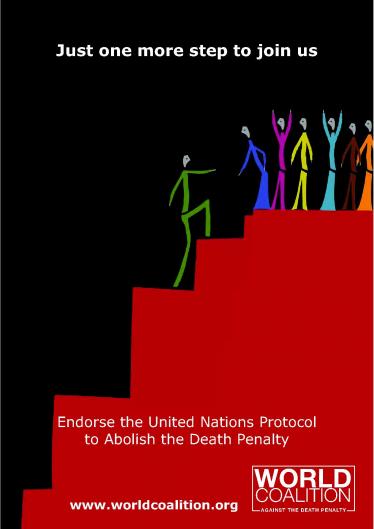
Just One More Step: Ratifying International and Regional Protocols
on 28 March 2022
As of 10 June 2024, 91 of the 173 States parties to the ICCPR have ratified or acceded to its Second Optional Protocol aiming at the abolition of the death penalty, most recently Côte d’Ivoire (3 May 2024), Kazakhstan (24 March 2022), Armenia (18 March 2021), Angola (2 October 2019) and the State of […]
2022
Central African Republic
Chad
Congo
Fiji
Ghana
Marshall Islands
Samoa
Sierra Leone
Suriname
Zambia

21st World Day Against the Death Penalty – The death penalty: An irreversible torture
on 12 June 2023
2023
Cruel, Inhuman and Degrading Treatment and Punishment
Death Row Conditions
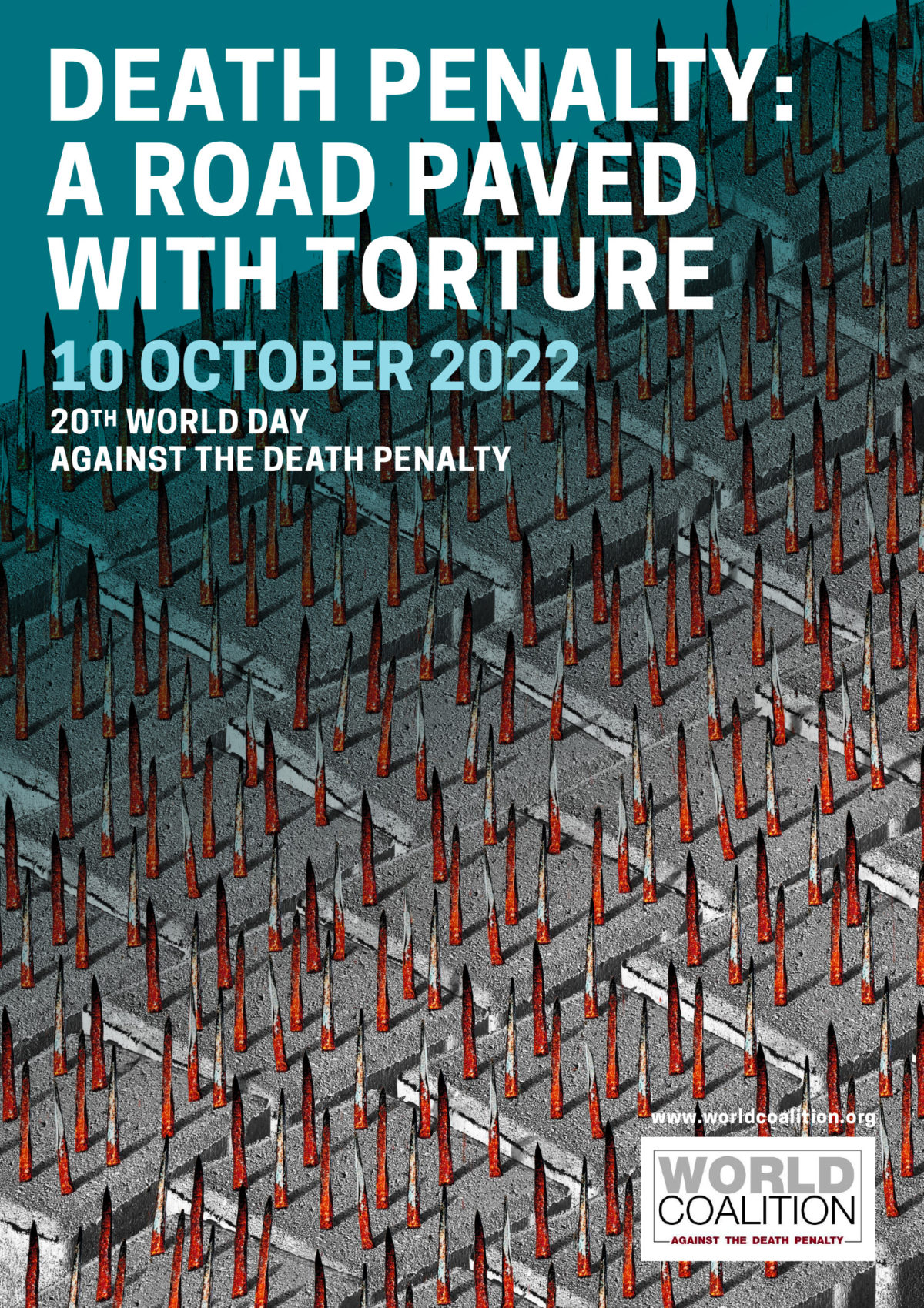
20th World Day Against the Death Penalty – Death penalty: a road paved with torture
on 10 June 2022
As the 20th World Day Against the Death Penalty is marked around the world, now is a time to consider and celebrate the gains the abolitionist movement has made over the past 20 years. Now, more than ever, abolitionist actors need to continue working towards the complete abolition of the death penalty worldwide, for all […]
2022
Cruel, Inhuman and Degrading Treatment and Punishment
Death Row Conditions

22nd World Day Against the Death Penalty – The death penalty protects no one.
on 12 June 2024
Observed every 10 October, the World Day Against the Death Penalty unifies the global abolitionist movement and mobilizes civil society, political leaders, lawyers, public opinion and more to support the call for the universal abolition of capital punishment.
2024
Public Opinion
Trend Towards Abolition
Document(s)
2022 World Day Report
By World coalition against the death penalty, on 12 June 2023
2023
Campaigning
World Coalition
frMore details Download [ pdf - 1557 Ko ]
On 10 October 2022, the World Coalition and abolitionists around the world celebrated the 20th World Day Against the Death Penalty (‘World Day’). Every year on World Day, the World Coalition highlights one problematic aspect of the Death Penalty.
- Document type Campaigning / World Coalition
- Available languages Rapport journée mondiale 2022
Article(s)
3rd World Congress Report: a 400-page strategy
on 22 April 2008
The report of the Paris World Congress, organised by Together Against the Death Penalty with the help of the World Coalition in Paris in 2007, is just out. Its aim is to serve as a “guide to abolitionist strategy”.
2008

Article(s)
ADPAN welcomes Mongolia’s decision abolish death penalty in law
By ADPAN, on 18 December 2015
Mongolia abolished the death penalty for all crimes in law on 3 December 2015 by adopting a new Criminal Code without any reference to capital punishment. Mongolia had already taken a strong commitment in 2012 by ratifying the Second Optional Protocol to the ICCPR, and it was one of the World Coalition’s target countries for the follow-up of the ratification campaign. The new Criminal Code will come into effect in September 2016
2015
Document(s)
Holdouts in the South Pacific: Explaining Death Penalty Retention in Papua New Guinea and Tonga
By Daniel Pascoe and Andrew Novak, on 1 September 2022
2022
Academic report
Papua New Guinea
Tonga
More details See the document
The South Pacific forms a cohesive region with broadly similar cultural attributes, legal systems and colonial histories. A comparative analysis starts from the assumption that these countries should also have similar criminal justice policies. However, until 2022, both Papua New Guinea and Tonga were retentionist death penalty outliers in the South Pacific, a region home to seven other fully abolitionist members of the United Nations. In this article, we use the comparative method to explain why Papua New Guinea and Tonga have pursued a different death penalty trajectory than their regional neighbours. Eschewing the traditional social science explanations for death penalty retention, we suggest two novel explanations for ongoing retention in Papua New Guinea and Tonga: the law and order crisis in the former and the traditionally powerful monarchy in the latter.
This article was first published in Crime Justice Journal: https://www.crimejusticejournal.com/issue/view/119
- Document type Academic report
- Countries list Papua New Guinea / Tonga
Document(s)
Taiwan: Amicus Curiae submission by Amnesty International and the World Coalition Against the Death Penalty to the Constitutional Court
By Amnesty International, on 23 April 2024
2024
NGO report
Taiwan
zh-hantMore details See the document
Published on April 8, 2024.
As the Constitutional Court of the Republic of China considers a challenge to the constitutionality of the death penalty, Amnesty International Taiwan and the World Coalition Against the Death Penalty submitted a joint amicus curiae intervention, to ensure the protection of the rights of all those under sentence of death. The amicus interveners argue that the use of the death penalty in the Republic of China constitutes a violation of human rights as guaranteed under the Constitution and international law and standards; and sets the country against the global trend, which remains overwhelmingly in favour of abolition.
- Document type NGO report
- Countries list Taiwan
- Available languages 憲法法庭法庭之友意見書 主案案號:111年度憲民字第904052號 法庭之友:國際特赦組織台灣分會 均詳委任狀 代 表 人:林綉娟 理事長 代 理 人:陳瑋珊 律師 均詳委任狀 均詳委任狀
Document(s)
Cameroon – Committee to Eliminate Racial Discrimination – Death Penalty – March 2020
By RACOPEM, ACAT Cameroun, on 21 March 2020
2020
NGO report
World Coalition
Cameroon
More details Download [ pdf - 1898 Ko ]
This report addresses Cameroon’s compliance with human rights obligations under the Convention on the Elimination of All Forms of Racial Discrimination, particularly with respect to the imposition of the death penalty against Anglophone Cameroonians.
By way of background, the Anglophone crisis in Cameroon began in 2016 as peaceful protests by lawyers and teachers demanding linguistic reforms but rapidly escalated into a war of secession that has killed thousands of people and displaced over one million.
The Cameroonian Criminal Code adopted in 2016 allows for the death penalty, including for vaguely defined terrorism-related offences. In this regard, the Anti-Terrorism Law of 2014 has been used to prosecute Anglophone human rights activists before military courts for acts of terrorism, secession, rebellion, and spreading false news, with the death penalty as a potential sentence in such cases.
While Cameroon ratified the International Covenant on Civil and Political Rights (ICCPR) in 1984, it has yet to ratify its Second Optional Protocol aiming at the abolition of the death penalty (ICCPR-OP2). Although no execution has taken place in Cameroon since 1997, civil society organizations estimate that 220 people currently are under sentence of death in Cameroon.
As discussed below, Cameroon fails to uphold its obligations under the International Convention on the Elimination of All Forms of Racial Discrimination because its domestic law and institutional and political framework do not sufficiently protect Anglophones facing the death penalty.
- Document type NGO report / World Coalition
- Countries list Cameroon
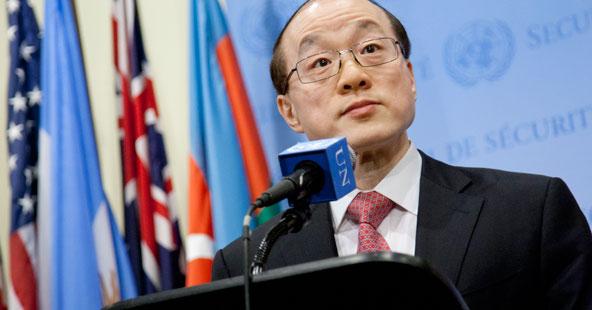
Article(s)
How far is China ready to reduce its use of the death penalty?
By Aurélie Plaçais, on 25 November 2013
The number one executioner in the world recently made national and international commitments to continuing to reform its death penalty, but how far is China really ready to go?
2013
China
Clemency
Drug Offenses
Terrorism
Article(s)
Capital punishment now part of Togo’s history
on 24 June 2009
Togo’s National Assembly passed a bill abolishing the death penalty on June 23, 2009. Spanish Prime Minister José Luis Zapatero, who was visiting the country, attended the parliamentary session to witness the event.
2009
Togo
Togo
Article(s)
Indonesian activists face upward death penalty trend
on 10 February 2009
Indonesia-based researcher Dave McRae finds that a core group of abolitionists are battling a rise in the number of executions, death sentences and death row inmates in the country.
2009
Cruel, Inhuman and Degrading Treatment and Punishment
Drug Offenses
Indonesia
Public Opinion
Article(s)
1,700-mile “Walk4Life” across the US
on 13 March 2008
American hip-hop artist Andre Latallade, also known as Capital-“X”, will walk 1,700 miles from New Jersey to Texas from March 31 to campaign against the death penalty.
2008
Drug Offenses
United States
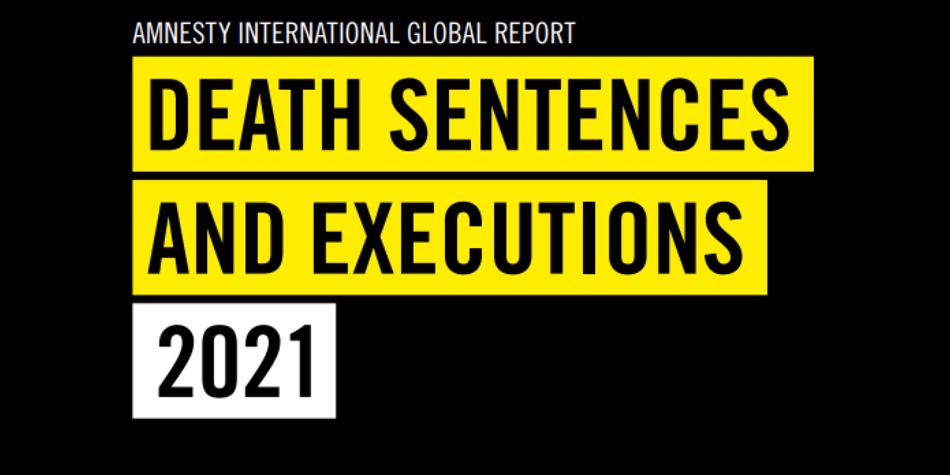
Article(s)
Executions on the rise, but progress toward abolition in 2021
By Amnesty International, on 9 June 2022
On 24 May, Amnesty International published their annual report on the global use of the death penalty, which shows the overall sentences and executions in 2021 Global figures Amnesty International recorded 579 executions in 18 countries in 2021, an increase of 20% from the 483 recorded in 2020. Despite these increases, the 2021 global executions figure constitutes the second-lowest figure recorded […]
2022
Death Row Conditions
Trend Towards Abolition
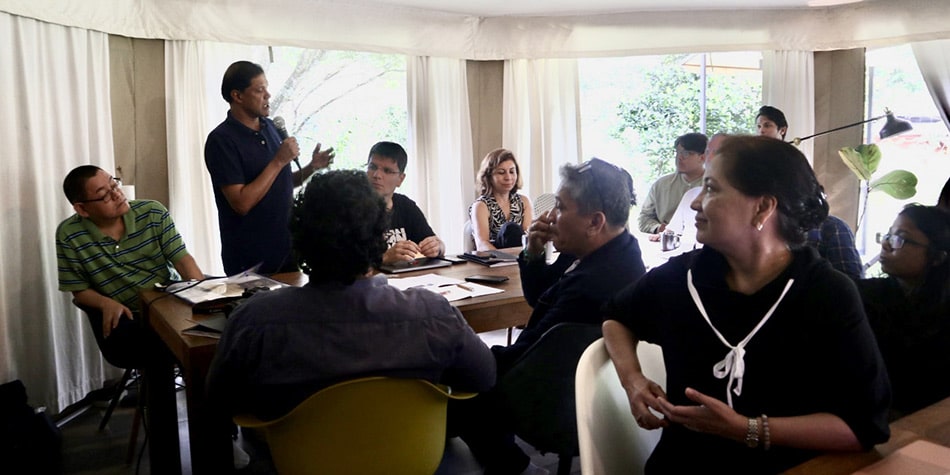
Article(s)
Debunking narratives for a return of the death penalty
By Venus Aves, on 13 November 2023
Time and time again, abolitionists have been making the case against the death penalty, highlighting how inhumane, inefficient and unfair it is.
2023
Drug Offenses
Maldives
Philippines
Public Opinion
Sri Lanka
Trend Towards Abolition
Turkey
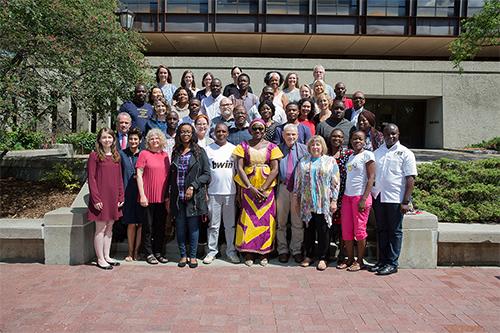
Article(s)
Makwanyane Institute Is Launched at Cornell Law School
By Sherrie Negrea, Cornell Law School, on 17 July 2017
Fifteen capital defense lawyers from eight African countries arrived at Cornell Law School on June 12 to begin eight days of training on how best to represent death penalty clients in the first session of the Makwanyane Institute.
2017
Legal Representation
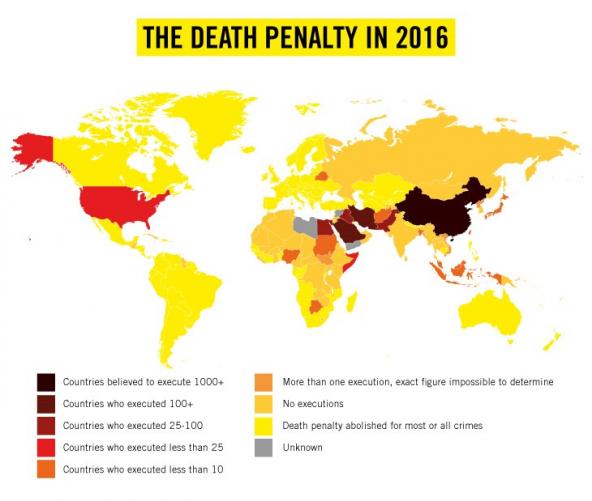
Article(s)
Death Sentences and Executions in 2016
By Amnesty International, on 11 April 2017
Amnesty International published its 2016 global review of the death penalty on Tuesday, April 11th 2017.Excluding China, states around the world executed 1,032 people in 2016. China executed more than all other countries in the world put together, while the USA reached a historic low in its use of the death penalty in 2016.
2017
Article(s)
Teaching abolition in Taiwan
on 9 December 2009
Tsou Tzung Han is a Taiwanese teacher who actively took part in educational activities organised around World Day Against the Death Penalty. He writes about his experience with his students.
2009
Public Opinion
Taiwan
Taiwan

Article(s)
New Hampshire: 21st State to Abolish the Death Penalty in the USA
By Aurelie Placais, on 12 June 2019
On 30 May 2019, the NH state Senate voted to override the governor’s veto. The death penalty repeal took effect immediately.
2019
United States
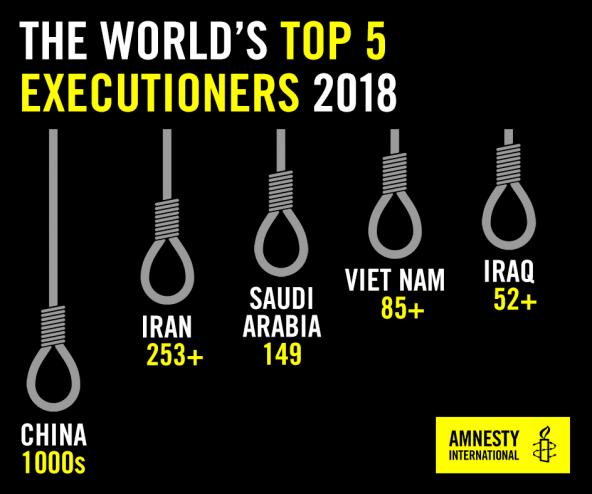
Article(s)
Death penalty 2018: Dramatic fall in global executions
By Amnesty International, on 10 April 2019
Despite a rise in executions in some countries, global executions fell by 31% in 2018. The universal fight for the abolition of the death penalty seems to be on the right way.
2019
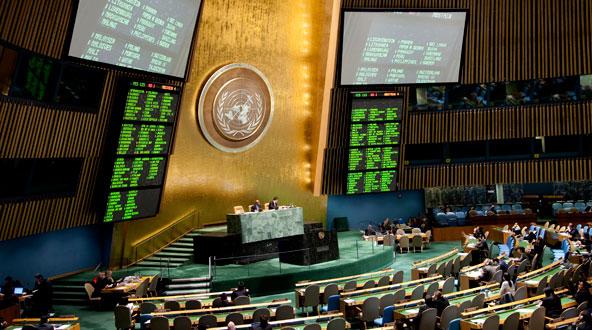
Article(s)
Death penalty: Global abolition closer than ever as record number of countries vote to end executions
By Amnesty International, on 17 December 2018
A record number of States – 121 out of 193 member states – voted in favour of a moratorium on the death penalty at the United Nations General Assembly on December the 17th. A world without the death penalty may become a reality according to Chiara Sangiorgio, Amnesty International’s Death Penalty Expert.
2018
Moratorium
Article(s)
The death penalty at the heart of ACHPR debates
on 18 May 2012
The 51st Ordinary Session of the African Commission on Human and Peoples’ Rights (ACHPR) was held in Banjul from April 18 to May 2, 2012. During the session, the Commission presented its “Study on the question of the death penalty in Africa” prepared by the Working Group on the death penalty of the ACHPR.
2012
Angola
Burundi
Gabon
Moratorium
Rwanda
Somalia
South Sudan
Sudan
Togo
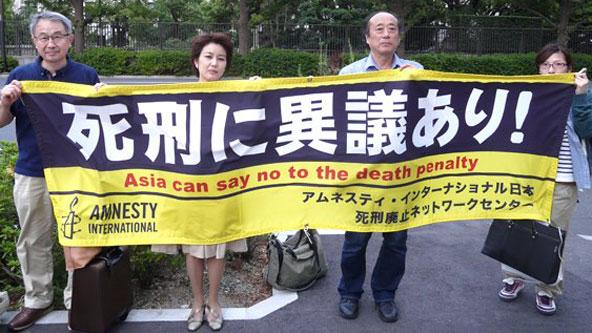
Article(s)
ADPAN network keeps up abolitionist fight
By Anti-Death Penalty Asian Network (ADPAN), on 10 October 2012
The Anti-Death Penalty Asia Network, which was founded on 10 October 2006, is again taking action this World Day Against the Death Penalty and takes stock on 10 years of progress in Asia – and on the challenges ahead.
2012

Article(s)
Justice ministers meet as Colosseum lights up to say yes to life
By Community of Sant'Egidio, on 10 December 2012
The Community of Sant’Egidio conducted a crucial political networking exercise in favour of abolition in Rome at the end of November before 1,600 cities lit up their monuments against the death penalty.
2012
Benin
Burundi
Central African Republic
France
Gabon
Italy
Kazakhstan
Kyrgyzstan
Mongolia
Public Opinion
Switzerland
Togo
United States
Uzbekistan
Zimbabwe
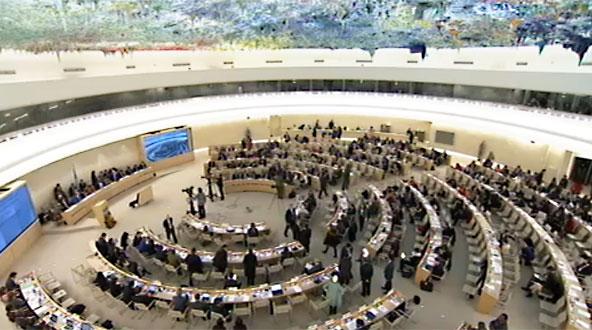
Article(s)
Death penalty: UN General Assembly human rights committee renews call for a moratorium on executions
By Amnesty International, on 23 November 2016
Today the overwhelming majority of UN member states once again threw their weight behind a UN General Assembly draft resolution to establish a moratorium on executions with a view to abolishing the death penalty. 115 of the UN’s 193 member states voted in favour of the proposal, with only 38 voting against it. The draft will now go before the UN General Assembly plenary for final adoption.
2016
Moratorium
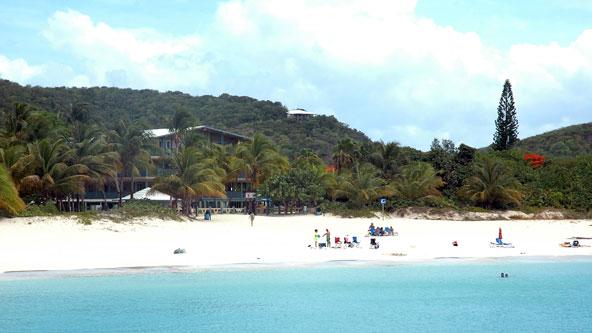
Article(s)
Suriname and Haiti to lead abolitionist way in the Caribbean
By Thomas Hubert (in San Juan, Puerto Rico), on 27 June 2014
The World Coalition held its 2014 AGM in abolitionist Puerto Rico and highlighted key regional developments in the fight against the death penalty, which remains on the books of many countries in the Greater Caribbean.
2014
Barbados
Haiti
Jamaica
Puerto Rico
Suriname
Suriname
Trinidad and Tobago
Article(s)
Second Optional Protocol: An irreversible mechanism for abolishing the death penalty” – Denys Robiliard
on 7 September 2020
Denys Robiliard, a lawyer and former president of Amnesty International’s French section, details why the Second Optional protocol to the UN’s ICCPR is an crucial instrument to push the abolition of the death penalty worldwide.
2020
Afghanistan
Article(s)
Petition against the Death Penalty
By World Coalition Against the Death Penalty, on 1 October 2011
139 nations have already abolished the death penalty. In December 2012, the United Nations’ General Assembly will vote on a resolution calling for a worldwide halt to its use. We, the undersigned, in recognition of the five million people who signed the moratorium petition that was handed to the United Nations’ General Assembly in […]
2011
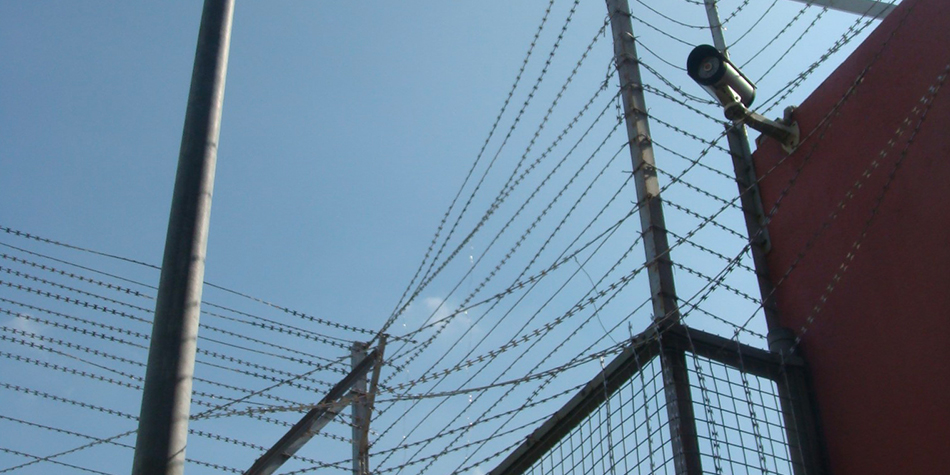
Article(s)
Does one year of “double zero” mean the death penalty has been repealed? How close is Taiwan to abolishing capital punishment?
By Lin Hsin-yi, Executive Director of the Taiwan Alliance to End the Death Penalty, on 28 April 2022
After the end of the last workday of 2021, it became clear that no one would be sentenced to death or executed that year – the first time ever that Taiwan has experienced “double-zero.”
2022
Taiwan
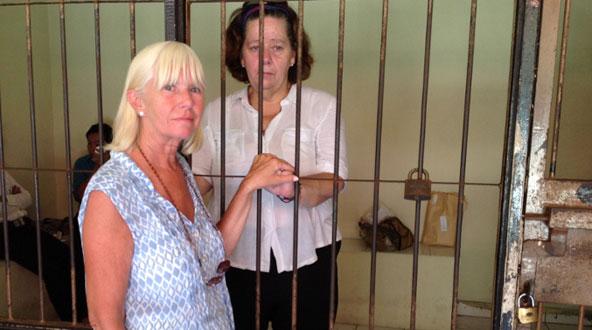
Article(s)
Briton’s death sentence puts Indonesians at risk
By KontraS, on 31 January 2013
The World Coalition’s Indonesian member organization KontraS has raised the international consequences of Lindsay Sandiford’s high-profile capital case in an opinion article published by the Jakarta Globe newspaper, calling on the country to abolish the death penalty.
2013
Drug Offenses
Indonesia
Moratorium
Document(s)
TESTIMONIES- 21 st World Day Against the Death Penalty
on 10 July 2023
2023
Campaigning
World Coalition
frMore details Download [ pdf - 759 Ko ]
This document has been compiled by the Secretariat of the World Coalition Against the Death Penalty with substantial aid from member organizations, including Abdorrahman Boroumand Center, Amnesty International, Cornell Center on the Death Penalty Worldwide, Free Mumia ! French Support Group (Collectif français “Libérons Mumia !”), German Coalition Against the Death Penalty, Justice Project Pakistan, […]
- Document type Campaigning / World Coalition
- Available languages TEMOIGNAGES - 21ème Journée mondiale contre la peine de mort
Article(s)
Internship opportunity at Centre on the Death Penalty, NLU Delhi
By NLU Delhi, on 1 April 2016
The Centre on the Death Penalty is keen to develop a robust and rewarding internship programme that will provide meaningful exposure to the complexities and nuances, in particular, of the administration of the death penalty and the criminal justice system in India more generally, therefore the centre introduces internship program where they accept interns on rolling basis.
2016
India
Document(s)
Death by Design: Part 1
By The Wren Collective , on 23 January 2024
2024
NGO report
Legal Representation
United States
More details See the document
Published in December 2023.
In “Death by Design” Parts 1 and 2, Wren investigated the state of court-appointed capital representation in Harris County—the death penalty capital of the world.The first report delves into the failings of the lawyers in capital cases.
Wren recommends a total overhaul to the system of capital representation for poor defendants in Harris County, with either the public defender absorbing those cases or the judges establishing a new, freestanding capital public defender that is independent from judicial oversight.
- Document type NGO report
- Countries list United States
- Themes list Legal Representation
Document(s)
Maldives – Committee Against Torture (LOIPR) – Death Penalty – June 2022
By The Maldivian Democracy Network (MDN) , on 21 July 2022
2022
NGO report
World Coalition
Cruel, Inhuman and Degrading Treatment and Punishment
Maldives
More details Download [ pdf - 1443 Ko ]
This report addresses the Maldives’ compliance with its human rights obligations with respect to the death penalty. Despite its long-standing, de facto moratorium on executions, the Maldives sentenced two people to death in 2019, after sentencing no one to death in 2018.[1] At the end of 2019, there were 19 people on death row in the Maldives – three of whom had exhausted their appeals and five of whom were juveniles when the crime was committed.[2] The Maldives sentenced another individual to death in 2022, which represented the first time the country sentenced a foreign national to death.[3] The continued use of the death penalty in sentencing is particularly concerning given evidence of due process violations, including the use of torture to obtain confessions, the lack of effective and accessible complaint mechanisms for detained individuals, the lack of an independent judiciary, and the use of the death penalty as a sentence for crimes committed by juveniles.
- Document type NGO report / World Coalition
- Countries list Maldives
- Themes list Cruel, Inhuman and Degrading Treatment and Punishment
Document(s)
The Use of the Death Penalty as a Bargaining Chip in Innocence Cases
By Claudia I. Salinas, California Western International Law Journal, on 1 February 2024
2024
Academic Article
United States
More details See the document
Published in 2023.
While 70% of the world’s countries have abolished the death penalty, also known as capital punishment, much of the United States continues to use it in its criminal legal proceedings.According to the Death Penalty Information Center, at least 190 people were exonerated prior to their fated execution date after being wrongly convicted and sentenced to death in the United States. There is no way to tell how many of the 1,562 people, who have been executed in the United States, were actually innocent. As there are wrongful convictions still happening today, it is no surprise that most countries consider the death penalty a human rights issue.
- Document type Academic Article
- Countries list United States
Document(s)
Detailed Factsheet
By World coalition against the death penalty , on 10 October 2011
2011
Campaigning
Trend Towards Abolition
frMore details Download [ pdf - 201 Ko ]
Detailed Factsheet 2019
- Document type Campaigning
- Themes list Trend Towards Abolition
- Available languages Fiche détaillée 2011
Document(s)
Sentenced to death without execution: Why capital punishment has not yet been abolished in the Eastern Caribbean and Barbados
By Death Penalty Project, on 1 January 2020
2020
NGO report
More details See the document
The report Sentenced to Death Without Execution, Why capital punishment has not yet been abolished in the Eastern Caribbean and Barbados, was published on 7 April 2020. It presents the views of opinion formers and was written by Roger Hood and Florence Seemungal with the assistance of Amaya Athill.Six independent nations in the Eastern Caribbean – Antigua and Barbuda, Dominica, Grenada, St Kitts and Nevis, St Lucia, and St Vincent and the Grenadines, all members of the Organisation of Eastern Caribbean States (OECS) – and Barbados, retain the death penalty for murder. Most of these countries have not executed anyone sentenced to death for at least ten years with the vast majority not carrying out an execution for more than twenty years.This independent empirical study, which presents the views of 100 ‘opinion formers’, drawn from the seven jurisdictions, aims to shed light on why these countries hang on to capital punishment and what are the barriers to the complete abolition of the death penalty in these nations. The respondents were asked about their knowledge of the use of capital punishment in their respective countries and the extent to which, and why, they either supported the policy of retaining the death penalty or were in favour of its abolition, as well as the factors, beliefs, and assumptions that appeared to account for their government’s unwillingness to embrace complete abolition.Key findings include:- Across these seven nations, 48 of the interviewees favoured retention of the death penalty (18 of them strongly) and 52 were in favour of its abolition (30 of them strongly) Of those who favoured retention of the death penalty, only a minority were committed to retaining it: only 10 of 48 interviewees said they would ‘strongly oppose an Act of Parliament to completely abolish the death penalty by definitely voting against it’. Respondents believed the best strategies to persuade their respective governments to embrace reform were: ‘through creating an influential civil society pressure group ‘Citizens Against the Death Penalty’; by ‘mounting a legal challenge to the constitutionality of the death penalty’; or by ‘persuading the government to establish a high-level commission to report on the subject’.
- Document type NGO report
- Themes list Legal Representation, Mandatory Death Penalty,
Document(s)
Qatar – Human Rights Committee – Death Penalty – January 2022
on 31 January 2022
2022
NGO report
World Coalition
Qatar
More details Download [ pdf - 236 Ko ]
Qatar had been maintaining a de facto moratorium on executions since 2000, but courts continued to sentence people to death. In 2020, however, Qatar executed a Nepali migrant worker by firing squad. Qatar’s death penalty practices are not in compliance with the Covenant. Qatar does not limit the death penalty to the most serious crimes, it is not taking steps toward a de jure moratorium on executions or ratification of the Second Optional Protocol, and it does not ensure that defendants in capital cases have a fair trial. Recent history suggests that a migrant worker may be more likely to be sentenced to death and executed for killing a Qatari national, as opposed to a non-citizen. Migrant workers are particularly vulnerable in the context of the country’s criminal legal system.
- Document type NGO report / World Coalition
- Countries list Qatar
Document(s)
Executing the Insane Is Against the Law of the Land. So Why Do We Keep Doing It?
By Stephanie Mencimer / Mother Jones, on 1 January 2015
2015
Article
United States
More details See the document
A recent article in Mother Jones examines lingering questions in the determination of which inmates are exempt from execution because of mental incompetency. In 1986, the U.S. Supreme Court ruled in Ford v. Wainwright that a person could not be executed if he or she was “unaware of the punishment they’re about to suffer and why they are to suffer it.” The 2007 ruling in Panetti v. Quarterman updated that decision, with Justice Anthony Kennedy writing, “A prisoner’s awareness of the State’s rationale for an execution is not the same as a rational understanding of it.” Scott Panetti (pictured), the inmate involved in the 2007 case, knew that the state of Texas planned to execute him for the murder of his in-laws, but also sincerely believed that he was at the center of a struggle between God and Satan and was being executed to stop him from preaching the Gospel.
- Document type Article
- Countries list United States
- Themes list Intellectual Disability,
Document(s)
Abolition of the Death Penalty in the Eastern Caribbean and Barbados
on 15 December 2020
2020
Lobbying
Barbados
Trend Towards Abolition
More details Download [ pdf - 2611 Ko ]
Greater Caribbean for Life has launched its educational toolkit to assist activists and organisations as they work toward abolishing the death penalty in the Greater Caribbean. The production of this toolkit forms part of GCL’s activities under its EU partnered project to educate on death penalty abolition in the Eastern Caribbean and Barbados.
The launch of the toolkit is timely as a few of these target countries recently voted against adopting the UN Moratorium on the use of the death penalty and countries that had previously chosen to abstain have now firmly voted against the resolution.
GCL members condemn the rise of violent crime in our region and express solidarity and compassion with the victims of crime, however, we reject the notion that capital punishment will act as a deterrent or foster respect for life in our communities.
It is our hope that this toolkit will assist in promoting respect for the right to life for all human beings in the Caribbean region.
- Document type Lobbying
- Countries list Barbados
- Themes list Trend Towards Abolition
Document(s)
Getting to Death: Race and the Paths of Capital Cases after Furman
By Fagan, Jeffrey and Davies, Garth and Paternoster, Raymond, Columbia Public Law Research Paper, Forthcoming, Cornell Law Review, Vol. 107, No. 1565, 2022, on 13 January 2023
2023
Academic report
Fair Trial
United States
More details See the document
Decades of research on the administration of the death penalty have recognized the persistent arbitrariness in its implementation and the racial inequality in the selection of defendants and cases for capital punishment. This Article provides new insights into the combined effects of these two constitutional challenges. We show how these features of post-Furman capital punishment operate at each stage of adjudication, from charging death-eligible cases to plea negotiations to the selection of eligible cases for execution and ultimately to the execution itself, and how their effects combine to sustain the constitutional violations first identified 50 years ago in Furman. Analyzing a dataset of 2,328 first- degree murder convictions in Georgia from 1995–2004 that produced 1,317 death eligible cases, we show that two features of these cases combine to produce a small group of persons facing execution: victim race and gender, and a set of case-specific features that are often correlated with race. We also show that these features explain which cases progress from the initial stages of charging to a death sentence, and which are removed from death eligibility at each stage through plea negotiations. Consistent with decades of death penalty research, we also show the special focus of prosecution on cases where Black defendants murder white victims. The evidence in the Georgia records suggests a regime marred less by overbreadth in its statute than capriciousness and randomness in the decision to seek death and to seek it in a racially disparate manner. These two dimensions of capital case adjudication combine to sustain the twin failures that produce the fatal lottery that is the death penalty.
- Document type Academic report
- Countries list United States
- Themes list Fair Trial
Member(s)
Coordination Eveil et cause pour l’Unité nationale et la lutte contre l’esclavage
on 30 April 2020
The Coordination Eveil et cause pour l’Unité nationale et la lutte contre l’eclavage is a non-governmental organization focused on the fight against slavery and its aftereffects. Created on 22 February 2012, it promotes a culture of Human rights and strenghten the national unity and and the bonds of love and brotherhood between every part of […]
2020
Mauritania
Document(s)
Living Under Sentence of Death
on 22 April 2022
2022
Academic report
NGO report
Bangladesh
Death Row Conditions
More details See the document
In 2019-20, The Department of Law at the University of Dhaka, in collaboration with the Bangladesh Legal Aid and Services Trust (BLAST) and The Death Penalty Project, conducted a study to investigate socio-economic characteristics and experiences of death row prisoners in Bangladesh.
Bangladesh continues to retain and implement the death penalty, with several executions taking place each year. Excluding laws relating to the defence forces and international crimes, there are currently 33 crimes punishable by death. 25 of these offences are non-lethal and arguably do not meet the threshold of the ‘most serious crimes’ under international law.
Inspired by similar studies in other countries, a pilot study was commissioned to examine the demographics and experiences of those sentenced to death. Consistent with those studies around the world, our findings evidence that the death penalty in Bangladesh is disproportionately used against the most vulnerable and marginalised sections of society.
72% of prisoners were classified as economically vulnerable
53% of prisoners were in low-paid work or unemployed
87% of prisoners had no qualifications beyond secondary school level
15% of prisoners had no formal education.
The study also raised serious concerns around the treatment of prisoners, the length of time prisoners spent in prison under the sentence of death and the integrity of criminal investigations and trial.
33% of prisoners’ families alleged their relative had been tortured in police custody, 5% suspected this and 15% refused to comment
60% of respondents were not satisfied with the trial process, with some claiming that the courts had failed to properly appreciate the evidence
On average it took over 10 years for death row cases to be disposed by the HCD (where sentences are confirmed). Prolonged time spent in isolation on death row, has been declared inhumane and degrading in many countries.
The sample consisted of 39 individuals on death row, evidence from their case files and face-to-face interviews with their families were conducted under rigorous ethical guidelines to reveal their profiles and experiences. Despite its small size, the sample is indicative of the general prison population allowing us to draw conclusions on possible trends.
- Document type Academic report / NGO report
- Countries list Bangladesh
- Themes list Death Row Conditions
Article(s)
World Coalition calls on Canada to keep up its efforts against the death penalty
on 10 March 2009
The World Coalition has sent a letter to Canadian Prime Minister Stephen Harper, asking him to “protect its nationals sentenced to death abroad, whether it is in a democratic country or not”.
2009
Canada
Canada
Clemency
United States

Article(s)
Congo’s Presidential Election Strengthens the Controversial New Constitution that Abolished Capital Punishment
By Delphine Lourtau and Marion Gauer, on 20 April 2016
On March 20, 2016, a tense presidential election in the Republic of the Congo resulted in the re-election of President Denis Sassou Nguesso, who has been in power for a total of 32 years. One of the election’s least discussed outcomes is its solidification of the new constitution that President Sassou introduced last year and that provides for abolition of the death penalty.
2016
Congo
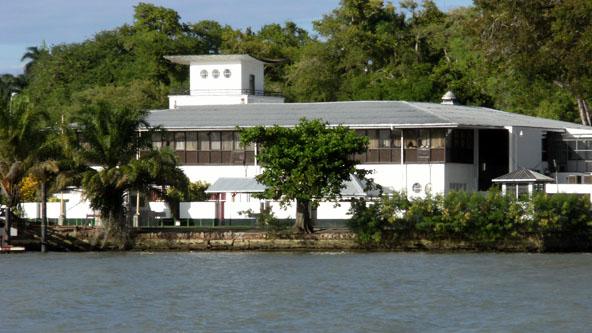
Article(s)
Capital punishment abolished in Suriname
By Parliamentarians for Global Action, on 6 March 2015
The Parliament of Suriname (photo) has abolished the death penalty in law, setting an example for the Greater Caribbean – a major front line in the global fight against capital punishment. World Coalition member organisation Parliamentarians for Global Action provided crucial support for abolition in Suriname.
2015
Suriname
Suriname

Article(s)
Sentenced to death without execution: Why capital punishment has not yet been abolished in the Eastern Caribbean and Barbados
By The death penalty project, on 4 May 2020
Roger Hood and Florence Seemungal with the assistance of Amaya Athill, published a empirical study aims to shed light on why Eastern Caribbean States and Barbados hang on to capital punishment even though they haven’t carried out any executions in the last ten years.
2020
Barbados
PHIL_2_page_handout_EN
on 10 August 2021
2021
Document(s)
Poster World Day 2005
By World Coalition against the death penalty , on 10 October 2005
2005
Campaigning
Trend Towards Abolition
frMore details Download [ pdf - 46 Ko ]
To date, 12 African countries have abolished the death penalty for all crimes;
20 retain the death penalty but are no longer carrying out executions; and 21 retain and use
the death penalty. The World Coalition against the death penalty has decided to devote the
World Day 2005 to a campaign to encourage all African countries to abolish capital
punishment permanently.
- Document type Campaigning
- Themes list Trend Towards Abolition
- Available languages Affiche journée mondiale 2005
Document(s)
Death Penalty Politics: The Fragility of Abolition in Asia and the Pacific
By Mark Finnane, Mai Sato and Susan Trevaskes, on 1 September 2022
2022
Academic report
More details See the document
Despite a steady increase worldwide in the number of states that have abolished the death penalty, capital punishment remains a troubling presence in the international order. The world’s leading powers in terms of economics and population include the retentionist states of China, India, Japan and the United States of America (USA). It seems there is no linear path to abolition, and its achievement is indeterminate. Yet, in international human rights law, death penalty abolition is a powerful norm embraced by half the countries across the world. While the majority of death penalty research has emanated from and focuses on the USA, well over 90 per cent of global executions occur in Asia, which lags behind the global trend towards abolishing the death penalty. Our symposium and this collection seek to bring perspectives from a variety of disciplines and methods—historical, legal, sociological, comparative— to bear on the questions of retention and abolition in a variety of jurisdictions and time periods.
This article was first published in Crime Justice Journal: https://www.crimejusticejournal.com/issue/view/119
- Document type Academic report
Document(s)
Intiatives World Day 2005
By World coalition against the death penalty , on 10 October 2005
2005
Campaigning
Trend Towards Abolition
frMore details See the document
Intiatives World Day 2005
- Document type Campaigning
- Themes list Trend Towards Abolition
- Available languages Initiatives journée mondiale 2005
Document(s)
Politics of International Advocacy Against the Death Penalty: Governments as Anti–Death Penalty Crusaders
By Mai Sato, on 1 September 2022
2022
Academic report
More details See the document
Two-thirds of the countries worldwide have moved away from the death penalty in law or in practice, with global and regional organisations as well as individual governments working towards universal abolition. This article critically examines the narratives of these abolitionist governments that have abolished the death penalty in their country and have adopted the role of ‘moral crusaders’ (Becker 1963) in pursuit of global abolition. In 2018, the Australian Government, while being surrounded by retentionist states in Asia, joined the anti–death penalty enterprise along with the European Union, the United Kingdom and Norway. Using the concepts of ‘moral crusader’ (Becker 1963) and ‘performativity’ (Butler 1993), this article argues that advocacy must be acted on repeatedly for governments to be anti–death penalty advocates. Otherwise, these government efforts serve political ends in appearance but are simply a self-serving form of advocacy in practice.
This article was first published in Crime Justice Journal: https://www.crimejusticejournal.com/issue/view/119
- Document type Academic report
Document(s)
Initiatives World Day 2006
By World Coalition against the death penalty , on 10 October 2006
2006
Campaigning
Trend Towards Abolition
frMore details See the document
Initiatives World Day 2006
- Document type Campaigning
- Themes list Trend Towards Abolition
- Available languages Initiatives journée mondiale 2006
Document(s)
Detailed Factsheet 2010
By World Coalition against the death penalty , on 10 October 2010
2010
Campaigning
Trend Towards Abolition
frMore details Download [ pdf - 479 Ko ]
Detailed Factsheet 2010
- Document type Campaigning
- Themes list Trend Towards Abolition
- Available languages Fiche détaillée 2010
Document(s)
Cuba – Committee Against Torture – Death Penalty – March 2022
on 21 March 2022
2022
NGO report
World Coalition
Cruel, Inhuman and Degrading Treatment and Punishment
Cuba
More details Download [ pdf - 250 Ko ]
Cuba has maintained a de facto moratorium on the imposition of the death penalty since its last reported execution in 2003. In 2010, Cuba’s Supreme Court commuted the death sentence of Cuba’s last remaining death row inmate. As of the date of this report, there is no record of an individual currently sentenced to death. Although a de facto moratorium is in place, Cuba has not committed to a de jure abolition of the death penalty, citing national security concerns.
- Document type NGO report / World Coalition
- Countries list Cuba
- Themes list Cruel, Inhuman and Degrading Treatment and Punishment
Document(s)
Children, Youth and the Death Penalty
By International Commission against the Death Penalty, on 23 June 2023
2023
NGO report
Juveniles
More details See the document
ICDP announces the launch of its latest report: Children, Youth and the Death Penalty. The issue of how the death penalty affects children and youth is often ignored by policy makers. This report aims to change that by putting the protection of children’s rights at the center of the debate on the death penalty.
The report builds on the panel discussion titled “Youth and the Death Penalty,” which was organized by the International Commission against the Death Penalty (ICDP) and the Government of Australia. The discussion was held on 29 June 2022, at the sidelines of the 50th session of the UN Human Rights Council, in Geneva.
- Document type NGO report
- Themes list Juveniles
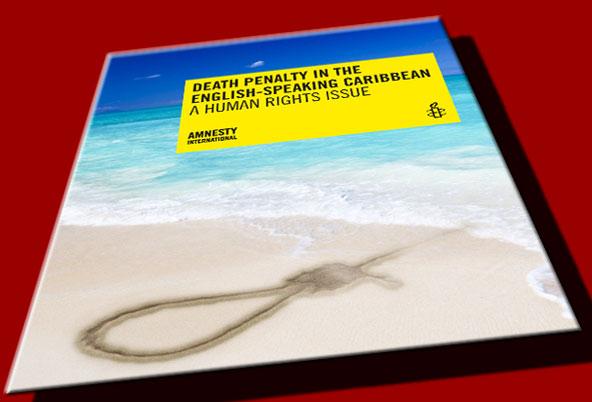
Article(s)
Call to end flawed Caribbean death penalty
By Thomas Hubert, on 10 December 2012
An appeal signed by local organizations and a new report by Amnesty International denounce multiple human rights violations in the use of capital punishment in the region and ask governments to “remove the death penalty once and for all from the law books”.
2012
Antigua and Barbuda
Bahamas
Barbados
Belize
Dominica
Fair Trial
Grenada
Guyana
Intellectual Disability
Jamaica
Mental Illness
Saint Kitts and Nevis
Saint Lucia
Saint Vincent and the Grenadines
Trinidad and Tobago
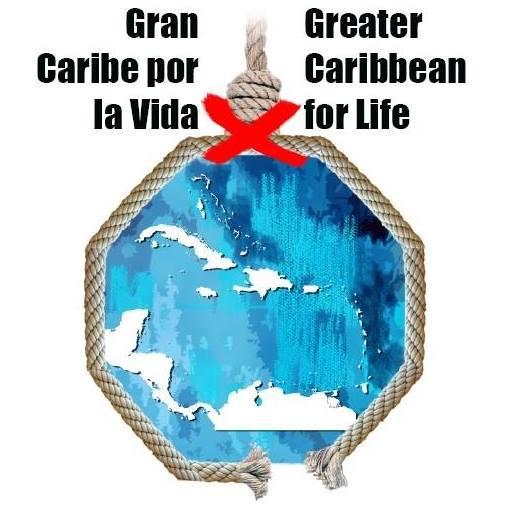
Article(s)
10 years with no hanging in the Caribbean
By Greater Caribbean for Life, on 19 December 2018
The Greater Caribbean for Life (GCL) notes that 19 December, 2018 marks the 10th anniversary of the hanging of Charles la Place in St Kitts and Nevis. He was the last person who was hanged in the English-speaking Caribbean.
2018
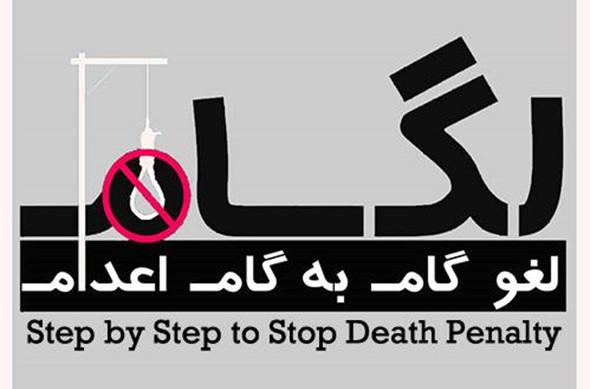
Article(s)
Iran’s brave human rights defenders and their struggle against the death penalty
By Amnesty International, on 5 March 2018
As the world moves away from the death penalty, Iran continues to execute hundreds of people every year and comes second only to China in the number of executions carried out annually. Amnesty International recorded nearly 1,000 executions in Iran in 2015 and at least 567 in 2016.
2018
Iran (Islamic Republic of)
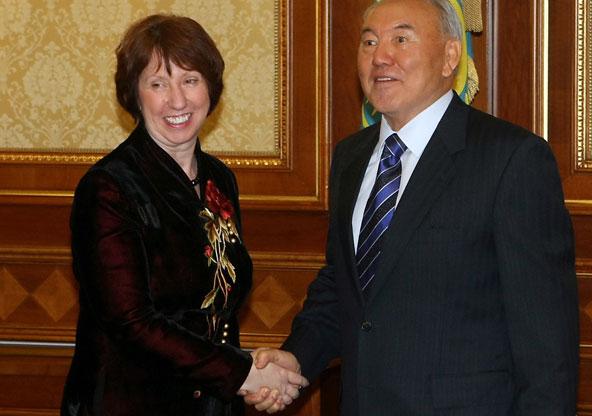
Article(s)
Kazakh criminal law reform could add capital crimes
By Thomas Hubert, on 15 February 2013
As Kazakhstan’s authorities prepare to introduce a new penal code, World Coalition members are warning against attempts to broaden the offences punishable by death.
2013
Kazakhstan
Moratorium
Public Opinion
Article(s)
Hands Off Cain holds moratorium conference in Gabon
on 11 December 2007
The Italian-based abolitionist group organised the event in Libreville on December 10, Human Rights Day 2007, with the government of Gabon and financial backing from the Dutch government.
2007
Burundi
Democratic Republic of the Congo
Gabon
Gabon
Mali
Moratorium
Article(s)
Can the US move towards abolition under Obama?
on 20 January 2009
The new president’s nominee for the post of attorney general opposes the death penalty and the number of executions and sentences is falling in the US.
2009
United States

Article(s)
Morocco’s death penalty takes centre stage at Marrakesh forum
By Thomas Hubert (in Marrakesh, Morocco), on 28 November 2014
Debates on the abolition of the death penalty at the World Human Rights Forum have highlighted the situation in the host country among the major fronts in the abolitionist struggle.
2014
Morocco
Article(s)
From Italian prisons to Texas death row
on 27 March 2008
A conference held near Naples, Italy last month helped around 200 attendees, most of them secondary school students, understand the death penalty situation in the US and relate it to prison issues in their own country.
2008
Death Row Conditions
Italy
United States
Article(s)
What now for Mumia?
on 28 April 2008
On 27 March, a US federal appeals court overturned Mumia Abu-Jamal’s death sentence, but not his conviction for murder. His lead counsel Robert R. Bryan gives his reaction to the ruling and the next steps in America’s most high-profile capital case.
2008
Fair Trial
United States
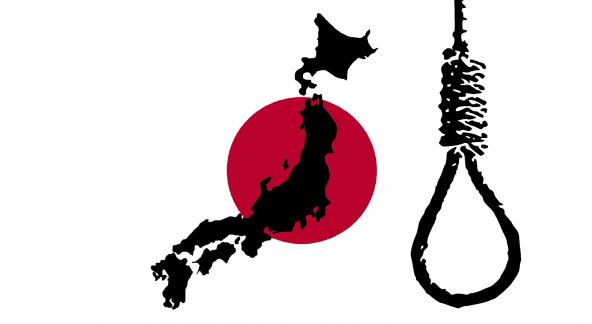
Article(s)
Regarding the execution in Japan of seven people
By World Coalition Against the Death Penalty, on 10 July 2018
STATEMENT – WORLD COALITION AGAINST THE DEATH PENALTY The World Coalition Against the Death Penalty would like to express its sympathy and support to all courageous anti-death penalty activists who have fought bravely to try to prevent the executions of seven people in Japan on the same day, on 6 July. The World Coalition calls […]
2018
Japan
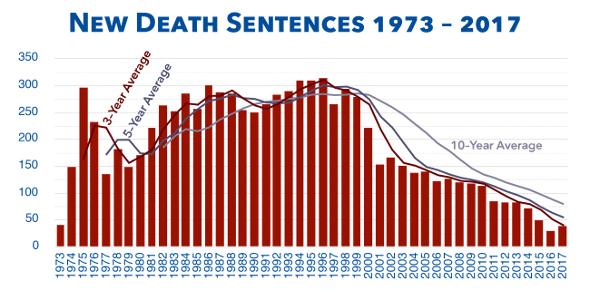
Article(s)
U.S. sees second fewest death sentences and executions in 25 Years
By Death Penalty Information Center, on 22 March 2018
Public support for the death penalty drops to 45-Year low as four More death-row prisoners Exonerated in 2017. “The Death Penalty in 2017: Year End Report” is now available.
2018
United States

Article(s)
Statement delivered to ACHPR on its 68th Ordinary Session
By FIACAT, FIDH, WCADP, Avocats Sans Frontières, COJESKI-RDC, ECPM, RAL and Reprieve, on 12 May 2021
Oral statement on behalf of FIACAT, FIDH, World Coalition against the Death Penalty, ECPM, Avocats sans frontières, COJESKI-RDC, ECPM, RAL and Reprieve on the activities of the Members of the Commission and the Special Mechanisms.
2021
Cruel, Inhuman and Degrading Treatment and Punishment
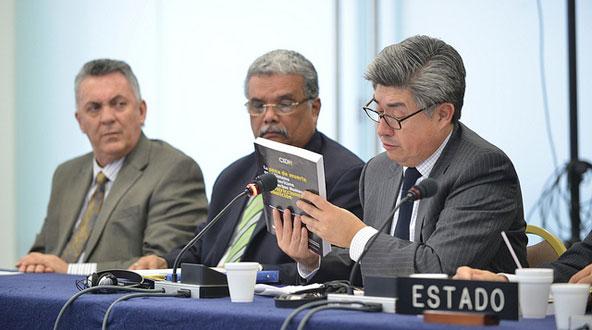
Article(s)
Organisation of American States considers moratorium
By Tiziana Trotta, on 15 March 2013
The Inter-American Commission on Human Rights warns that litigation is insufficient to combat the death penalty.
2013
Argentina
Brazil
Costa Rica
Cuba
Dominican Republic
Ecuador
Guatemala
Mexico
Moratorium
Panama
Suriname
Trinidad and Tobago
United States
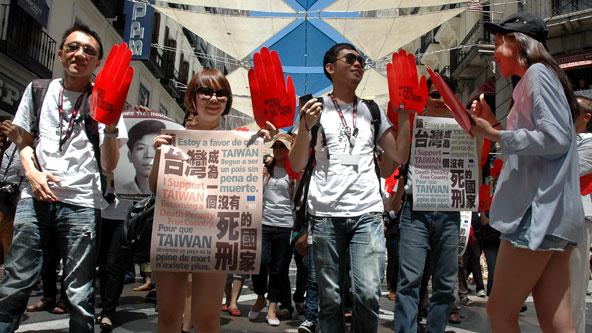
Article(s)
Asian progress paves the way for new strategies
By Thomas Hubert, on 20 June 2013
Although most executions continue to take place in Asia, their number is going down – and abolitionists are coming up with new ideas to bring about abolition.
2013
India
Japan
Malaysia
Mongolia
Moratorium
Singapore
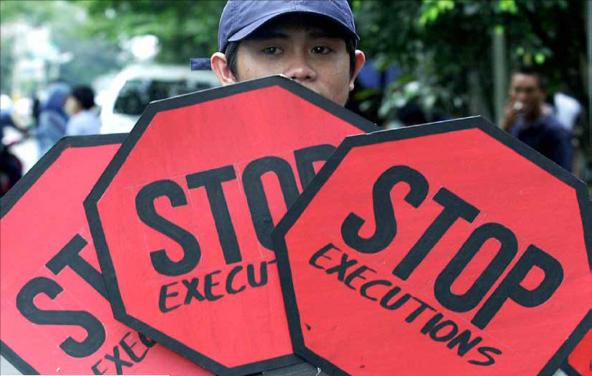
Article(s)
ASEAN countries step back on the path towards abolition
By Tiziana Trotta, on 27 October 2016
Asia has the highest number of retentionist countries in the world. Eight members of the Association of Southeast Asian Nations (ASEAN) retain the death penalty and four of them carried out executions in 2015.
2016
Drug Offenses
Terrorism
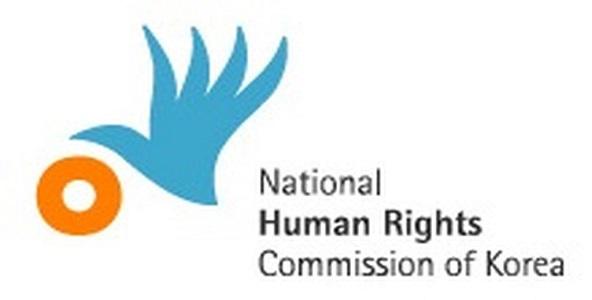
Article(s)
After more than 20 years without executions, a trend toward an official moratorium?
By Clémentine Etienne, on 27 June 2018
On 18 June 2018, the Korean National Human Rights Commission (NHRC) called on the South Korean President to declare an official moratorium on the death penalty to mark the 70th anniversary of the Universal Declaration of Human Rights on December 10.
2018
Republic of Korea
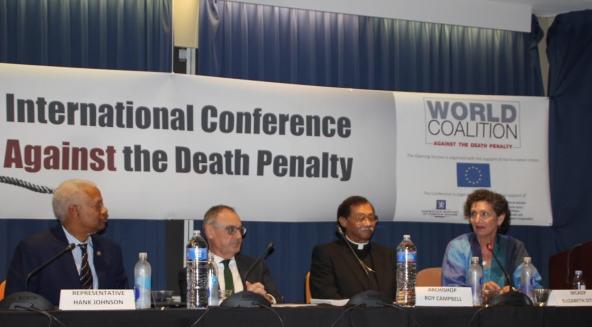
Article(s)
International Conference Against the Death Penalty: abolistionists are united and determined
By Lorène du Crest, on 18 July 2017
The World Coalition Against the Death Penalty celebrated its 15th anniversary with an International Conference and its General Assembly on 22-24 June in Washington DC.
2017

18th World Day Against the Death Penalty: Access to Counsel – A Matter of Life or Death
on 18 September 2020
Without access to effective legal representation during arrest, detention, trial and post-trial, due process cannot be guaranteed. In a capital case, the consequences that can arise from a lack of effective legal representation can be nothing less than the difference between life and death. On the national and international levels, the right to legal representation […]
2020
Public Opinion

Helping the World Achieve a Moratorium on Executions
on 20 December 2022
In 2007, the World Coalition made one of the most important decisions in its young history: to support the Resolution of the United Nations General Assembly for a moratorium on the use of the death penalty as a step towards universal abolition. A moratorium is temporary suspension of executions and, more rarely, of death sentences. […]
2022
Moratorium

Article(s)
Philippines: one step forward in the reintroduction of the death penalty
By Lorène du Crest, on 3 March 2017
The Philippines are a step closer to the reintroduction of the death penalty, violating their international obligations.
2017
Drug Offenses
Philippines
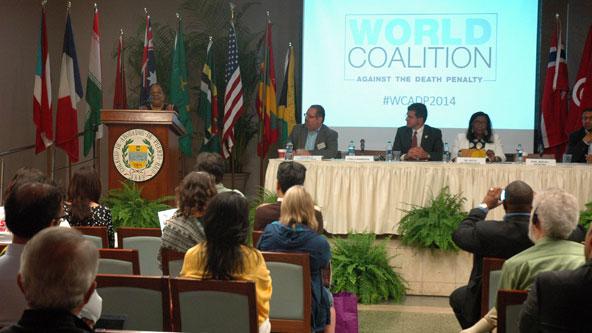
Article(s)
World Coalition raises mental health issues in administration of the death penalty
By Thomas Hubert (in San Juan, Puerto Rico), on 22 June 2014
World abolitionists gathered in Puerto Rico between 20-22 June to take stock on progress in the crucial Caribbean region and prepare for the next round of the fight against the death penalty.
2014
Puerto Rico
Document(s)
Death Penalty in Liberia. When will it be abolished?
By FIACAT, on 1 January 2019
2019
Arguments against the death penalty
More details See the document
The FIACAT and ACAT Liberia organized an awareness-raisingworkshop on 17 and 18 September 2019 in Monrovia (Liberia) for 30 participants: Muslim and Christian religious leaders, traditional chiefs, members of civil society organizations, journalists, members of the Independent National Commissionon Human Rights (INCHR) and parliamentarians. This workshop resulted in the production of this publication to raise awareness among opinion leaders on the abolition of the death penalty in Liberia, considering the specific characteristicsand needs of the country.
- Document type Arguments against the death penalty
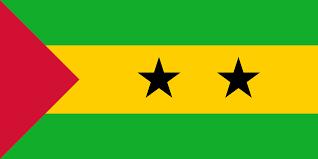
Article(s)
São Tomé and Príncipe ratifies OP2 and approves total and definitive abolition of the death penalty
By Elise Guillot, on 18 January 2017
On 10 January 2017, São Tomé and Príncipe ratified the Second Optional Protocol to the International Covenant on Civil and Political Rights, aiming at the abolition of the death penalty and became its 84th State party.
2017
Sao Tome and Principe
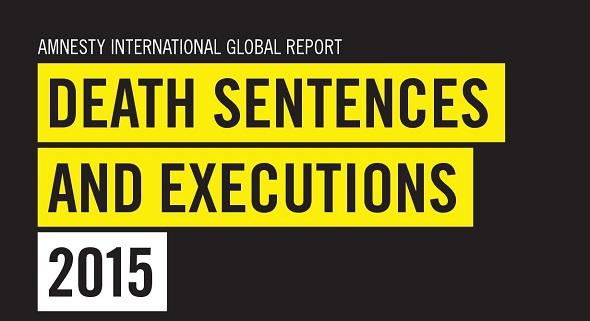
Article(s)
Death sentences and executions in 2015
By Amnesty International, on 10 April 2016
This report covers the judicial use of the death penalty for the period January to December 2015. As in previous years, information is collected from a variety of sources, including: official figures; information from individuals sentenced to death and their families and representatives; reporting by other civil society organizations; and media reports. Amnesty International reports only on executions, death sentences and other aspects of the use of the death penalty, such as commutations and exonerations, where there is reasonable confirmation.
2016
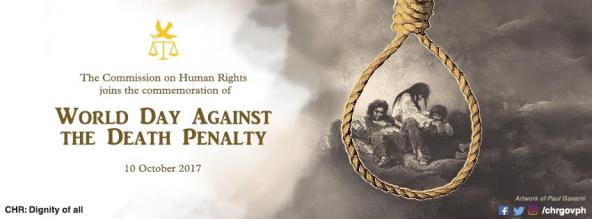
Article(s)
The Commission on Human Rights of the Philippines launches a campaign against the reinstatement of the death penalty in the country
By Thalia Gerzso, on 26 October 2017
Despite its national and international commitment not to carry out any executions, Philippines is taking worrying measures toward the reinstatement of the death penalty for drug offenses. Determined to thwart the government’s plan, the Commission on Human Rights of the Philippines has taken various actions, including an awareness campaign for the 15th World Day Against the Death Penalty.
2017
Philippines
Public Opinion

Article(s)
Marc Bossuyt: “Countries that have not signed up to the Protocol should feel isolated”
By Pierre Désert, on 27 June 2008
Marc Bossuyt was UN Special Rapporteur for drawing up the Second Optional Protocol to the International Covenant on Civil and Political Rights. He is now president of Belgium’s Constitutional Court.
2008
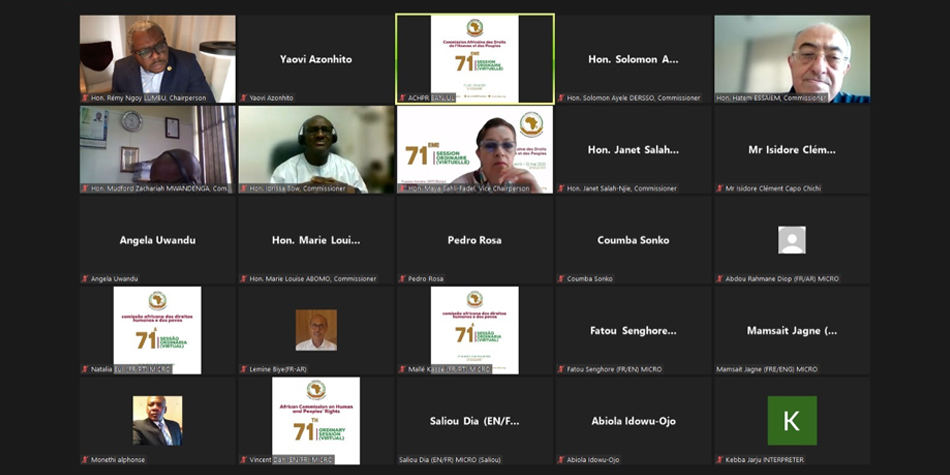
Article(s)
71st Ordinary session of the African Commission: focus on torture and the death penalty
By Sarah Saint-Sorny, on 9 June 2022
The African Commission on Human Rights and People (ACHPR) once again met on Zoom for its 71st Ordinary session from April 21st to May 13th, 2022. The honorable Rémy Ngoy Lumbu, President of the Commission, has expressed his hopes for the next session to take place in person in Banjul this autumn.
2022
Central African Republic
Congo
Democratic Republic of the Congo
Kenya
Malawi
Mauritania
Niger
Nigeria
Sierra Leone
Tunisia
Zambia
Article(s)
Campaigners and political leaders unite against the death penalty
on 24 February 2010
Representatives from 56 abolitionist and retentionist countries attended the opening session of the World Congress Against the Death Penalty in Geneva.
2010
Belarus
France
Italy
Mongolia
Norway
Qatar
Senegal
Spain
Switzerland
Viet Nam
Article(s)
Mali: is abolition in sight?
on 4 June 2008
With public meetings, football matches and media action Malian activists have been covering all bases to try to push through adoption of a law abolishing the death penalty before the end of the parliamentary session.
2008
Innocence
Mali
Mali
Moratorium
Article(s)
30 countries gather in Rome to oppose capital punishment
on 21 May 2010
17 ministers and numerous experts met in Rome on May 17 to discuss crime-busting policies that reject the death penalty. Representatives for the Republic of Congo and Burkina Faso pledged their support for abolition.
2010
Italy
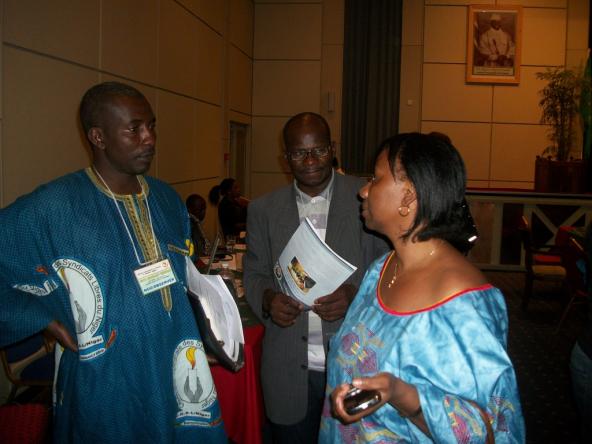
Article(s)
African human rights body targets death penalty
on 16 May 2011
The abolition of the capital punishment figured prominently at the 49th session of the African Commission of Human and People’s Rights.
2011
Algeria
Botswana
Democratic Republic of the Congo
Equatorial Guinea
Mauritania
Public Opinion
Somalia
Sudan
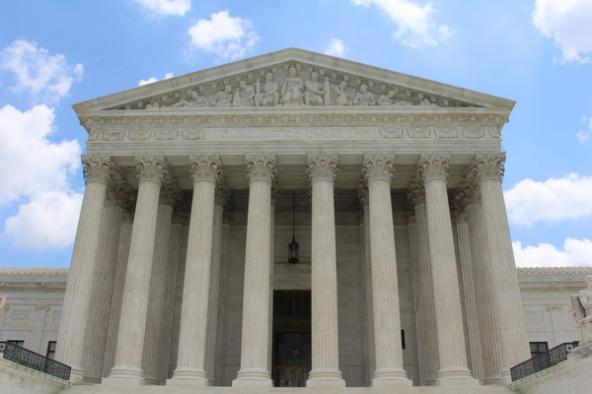
Article(s)
US Federal Executions Resume
By Louis Linel, on 28 July 2020
It has been 17 years since the United States decided on a de facto moratorium on federal executions, which can be carried out only for certain federal criminal offences. This moratorium, however, ended in July.
2020
Moratorium
United States
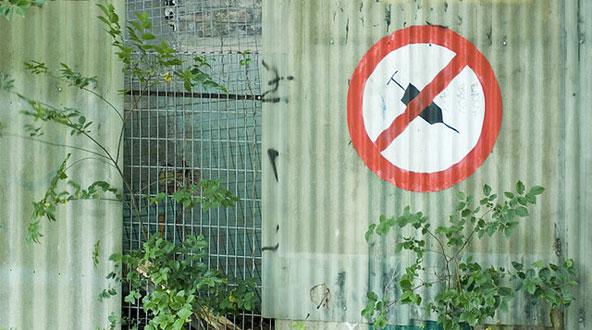
Article(s)
The shared responsibility of capital punishment
on 27 September 2011
Everyone agrees that the highest international standards should apply in the fight against drug. But what about the standards used in punishing traffickers- and the inappropriate use of the death penalty against such criminals?
2011
Australia
Bhutan
Colombia
Drug Offenses
Indonesia
Italy
Mozambique
Nepal
Niue
Pakistan
Philippines
South Africa
State of Palestine
Sweden
Taiwan
Terrorism
Thailand
Article(s)
Benin on track to achieve abolition
on 7 February 2010
Benin’s President Thomas Yayi Boni, one of the World Congress’s guests, has asked the parliament to enshrine the abolition of the death penalty in the constitution. Justice Minister Victor Tokpanou details Benin’s path to abolition.
2010
Benin
Benin
Public Opinion
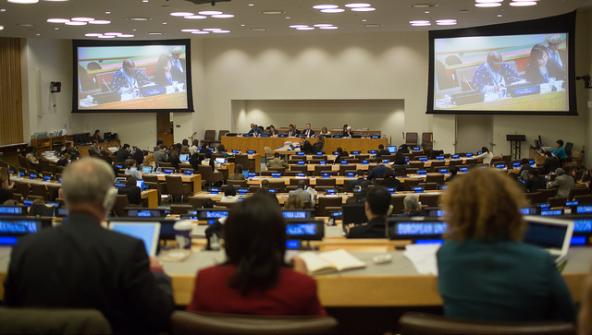
Article(s)
Call for Moratorium on Executions Gains Record-High Support at Committee Vote
By Amnesty International & Comunità di Sant'Egidio, on 16 November 2018
Today the international community offered unprecedented support to a UN call to halt executions when the Third Committee of the UN General Assembly considered a draft resolution on a moratorium on the use of the death penalty.
2018
Moratorium

